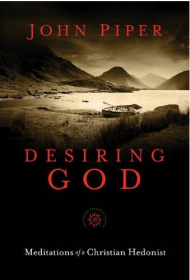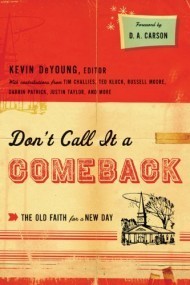Justin Taylor's Blog, page 362
February 2, 2011
What Kind of Religion Is This?!
"In a sermon Dick Lucas once preached, he recounted an imaginary conversation between an early Christian and her neighbor in Rome.
"Ah," the neighbor says. "I hear you are religious! Great! Religion is a good thing. Where is your temple or holy place?"
"We don't have a temple," replies the Christian. "Jesus is our temple."
"No temple? But where do your priests work and do their ritual?"
"We don't have priests to mediate the presence of God," replies the Christian. "Jesus is our priest."
"No priests? But where do you offer your sacrifices to acquire the favor of your God?"
"We don't need a sacrifice," replies the Christian. "Jesus is our sacrifice."
"What kind of religion is this?" sputters the pagan neighbor.
And the answer is, it's no kind of religion at all."
—Tim Keller, King's Cross: The Story of the World in the Life of Jesus, p. 48.
What Are the Marks of a Crusty Christian?
Kevin DeYoung:
For starters, it's an attitude. It's a demeanor where being Calvinist or paedobaptist or inerrantist (three things I am gladly) are put on like armor or wielded like weapons, when they are meant to be the warm glow of a Christian whose core radiates with love for Christ and the gospel. I believe in theological distinctives—I believe in them and I believe it is good to have them—but if the distinctives are not manifestly the flower of gospel root, the buds aren't worth the blooming.
A second mark of crusty Christians is approachability, as in, not having any. There is a sizing up-ness that makes some theological types unnecessarily prickly. They are bright and opinionated and quickly analytical. They can also be incessantly critical. Crusty Christians are hard to be around. They are intimidating instead of engaging and growling instead of gracious. They are too willing to share their opinions on everything and unable to put any doctrine in any category not marked "absolutely essential."
—Kevin DeYoung, "The Crust and the Core," in The Good News We Almost Forgot (Moody, 2010), pp. 241–44.
HT: Andy Naselli, via Z
You Are Neither Too Good to Need Grace, Nor Too Bad to Receive It
Following up on Tim Keller and John Newton's thoughts on superiority and inferiority complexes, here are some wise thoughts form David Powlison's chapter "Who Is God?" in Seeing with New Eyes: Counseling and the Human Condition through the Lens of Scripture:
Left to ourselves, we think we are either too good to need grace or too bad to receive it.
Are you too good to need a major redemption?
Do you counsel someone or live with someone who is "above" needing Christ?
Do you work with someone who lives for his or her desires: superiority to others, aggrieved self-pity, greedy cravings for more and better stuff, the insect of sexual lust, well-nursed grievances, chasing pipe dreams of success and happiness?
Grace pesters and pursues us—it is grace, after all, that makes me even aware that sin is my deepest problem.
Are you a wife who has contempt for your husband?
A husband who has written off your wife as a hopeless case?
A teenager who feels justified in feeding dark thoughts?
A parent who frets or seethes at your children?
A single whose life is stained by disgruntlement because you've been shafted by life?
Grace wakes you up to your need for grace. You were dead and dark (2:1-3; 5:8). God made you alive (2:4-10). Don't go back into darkness (4:17-19). Walk in light (5:9-20).
Perhaps you have been sinned against terribly.
Perhaps your own selfishness and sense of entitlement make you magnify minor offenses into capital crimes.
Perhaps your own sins provoked others to retaliate sinfully, reaping what you sow.
In any case, the riches of mercy for you can make you merciful to others.
Grace turns you upside down: the self-righteous and destructive become the grateful and constructive.
Are you too bad to receive grace?
Grace woos and comforts us when we think we are too far gone to be rescued.
How could you be too bad to receive what is for the bad?
Perhaps you are tempted to despair about yourself.
Perhaps someone you counsel is tempted to give up: "God could not possibly love me or help me. My failures are too much, too often, too strong. My sins are incurable. My situation is hopeless. I'm stuck and will never change. God is as disgusted with me as I am disgusted with myself."
Is there anyone whose badness exceeds the diagnosis God makes of each of us?
You were dead in your trespasses and sins, in which you formerly walked according to the course of this world, according to the prince of the power of the air, of the spirit that is now working in the sons of disobedience. Among them we too all formerly lived in the lusts of our flesh, indulging the desires of the flesh and of the mind, and were by nature children of wrath, even as the rest. (2:1-3)
If the diagnostic shoe fits, wear it. But then look at the wonderful, specific cure!
Is there anyone whose badness is so bad that it exceeds the scope and power of the cure?
"But God, being rich in mercy, because of His great love with which He loved us, even when we were dead in our transgressions, made us alive together with Christ—by grace you have been saved" (2:4f).
God lavishes grace on us in Christ.
February 1, 2011
The Gospel Key to Pursuing Personal Holiness
 In John Piper's address on Robert Murray McCheyne he talked about the gospel key to pursuing holiness:
In John Piper's address on Robert Murray McCheyne he talked about the gospel key to pursuing holiness:
God had given McCheyne the gospel key to pursuing personal holiness.
He received it through the teaching of Thomas Chalmers. Chalmers was very concerned about excessive introspection in the pursuit of holiness. He knew that a believer cannot make progress in holiness without basing it on the assurance of salvation. And yet the effort to look into our sinful hearts for some evidences of grace usually backfires.
Chalmers said that glimpses into the dark room of the heart alone give no good prospect. Instead, he said we should
take help from the windows.
Open the shutters and admit the sun.
So if you wish to look well inwardly, look well out. . . . This is the very way to quicken it.
Throw widely open the portals of faith and in this, every light will be admitted into the chambers of experience.
The true way to facilitate self-examination is to look believingly outwardly.
McCheyne had written that down in a class and underlined the last sentence. So it is not surprising to hear him give his own counsel in similar terms:
Learn much of the Lord Jesus.
For every look at yourself take ten looks at Christ.
He is altogether lovely . . . .
Live much in the smiles of God.
Bask in his beams.
Feel his all-seeing eye settled on you in love.
And repose in his almighty arms.
This was the basic strategy in the pursuit of holiness. And he knew that the battle would have to be waged all the way to the end. He said to his people, "When a soul comes to . . . Christ, it is not made perfectly holy all at once. 'The path of the just is as the shining light, that shineth more and more unto the perfect day [Proverbs 4:18].'"
He was often distressed by his own lack of holiness. But he knew that the battle would be won only in the gospel way of looking ten times to Jesus and "being transformed into the same image from one degree of glory to another" (2 Corinthians 3:18).
"Adopted for Life": Free Audiobook
February's free book-of-the-month from ChristianAudio is Russell Moore's outstanding book, Adopted for Life.
If you're not familiar with the book, I'd highly recommend reading or listening to it. Below are some related video resources.
In the following conversation, my audio is poor but Dr. Moore's is clear:
Here's a little table of contents for our nearly 45-minute discussion:
Introduction (0:36)
Adopted for Life: Some Personal Background (11:10)
Some Rude Questions about Adoption (3:05)
Adoption and the Fatherhood of God (1:50)
Talking to Your Children about Adoption (2:25)
The Fears and Costs of Adoption (7:49)
Adoption and Being Truly Pro-Life (3:45)
Creating a Culture of Adoption (7:11)
Husbands Who Don't Want to Adopt (10:38)
Also, Dr. Moore made video overviews for each chapter:
Introduction: Why I Wrote This Book
Chapter 1: Jesus, Adoption, and You
Chapter 2: Are They Brothers?
Chapter 3: Jesus of Nazareth vs. Planned Parenthood
Chapter 4: Don't You Want Your Own Kids?
Chapter 5: Paperwork, Finances, and Other Threats to Personal Sanctification
Chapter 6: Jim Crow in the Church Nursery
Chapter 7: It Takes a Village to Adopt a Child
Chapter 8: Adoption is a Past-Tense Verb
Chapter 9: Concluding Thoughts
How an Inferiority Complex Can Be a Form of Pride
Tim Keller, writing in his new book King's Cross (on the Gospel of Mark), looks at how saying "I'm unworthy" can sometimes function not as a plea for deliverance but as a form of pride:
There are two ways to fail to let Jesus be your Savior.
One is by being too proud, having a superiority complex—not to accepted his challenge.
But the other is through an inferiority complex—being so self-absorbed that you say, "I'm just so awful that God can't love me." That is, not to accept his offer.
Keller goes on to quote from John Newton's letter to a very depressed correspondent:
You say you feel overwhelmed with guilt and a sense of unworthiness.
Well, you cannot be too aware of the inward and inbred evils you complain of, but you may be (indeed you are) improperly controlled and affected by them.
You say it is hard to understand how a holy God could accept such an awful person as yourself.
You, then, not only express a low opinion of yourself (which is right!) but also too low an opinion of the person, work, and promises of the Redeemer, which is wrong. . .
You complain about sin, but when we examine your complaints, they are so full of self-righteousness, unbelief, pride, and impatience that they are little better than the worst evils you complain of!
—Works of John Newton, vol. 6, p. 185.
January 31, 2011
An Interview with John Piper on the 25th Anniversary Edition of Desiring God
 Multnomah recently published a 25th anniversary edition of John Piper's classic, Desiring God, Meditations of a Christian Hedonist. Piper was kind enough to answer a few questions:
Multnomah recently published a 25th anniversary edition of John Piper's classic, Desiring God, Meditations of a Christian Hedonist. Piper was kind enough to answer a few questions:
I know this book originally started as a sermon series in the Fall of 1983. How did it go from these nine sermons to a book published in 1986/1987?
I owe Steve Halliday a huge and joyful debt of gratitude. He had been a student at Bethel Seminary and so knew of my move from college teaching to the pastorate in 1980. In 1983 he was an editor with Multnomah Publishers. He was in town and called me on the phone and asked what I was preaching. I told him, and he asked if we could get together. Looking over what I was doing, he asked if he could run it by the editorial team at Multnomah. I said yes.
They wanted to make a book out of it, and so for the next three years, I used my spare time (no writing leave in those days) to write Desiring God, increasing the length of the sermons threefold.
As I look back now on those years, I don't know how I managed it. The pressures at church were huge, and I was coming up on 40 with unhelpful midlife moods. Sometimes you can only see sovereign grace in retrospect.

John Piper mailing the manuscript of Desiring God to Multnomah in 1986
In the Preface you explain the convergence of a number of things that turned you into a "Christian Hedonist" (Pascal, Lewis, the Psalms, etc.). Did you invent the term, or did you learn it from Daniel Fuller?
I don't remember. I certainly saw the word "hedonism" used positively in several authors roughly in the way I use it. I don't recall seeing the exact phrase "Christian Hedonism."
The key living person in shaping the vision was Daniel Fuller. His unpublished Hermeneutics Syllabus that I read in his class in the Fall of 1968 had a section entitled "We are far too easily pleased." This section developed the argument of C. S. Lewis from his sermon "The Weight of Glory." The first page of that sermon, and it's unpacking by Dan Fuller, was the flashpoint where thing exploded in my head and heart.
Was there a moment you remember when the thesis crystallized in your mind: "God is most glorified in us when we are most satisfied in him"?
As I recall one of the most influential early evidences for that truth in my experience was the coming together of two passages on prayer in John's Gospel: John 14:13 and 16:24, "Whatever you ask in my name, this I will do, that the Father may be glorified in the Son. . . . Ask, and you will receive, that your joy may be full." Prayer assumes the pursuit of God's glory and our joy. Only later did I see the way Paul argued in Phil. 1:20–21—that Christ is magnified most in our dying when we count dying gain; that is, when we are more satisfied in him than anything this life offers.
I had read in seminary Edwards's End for Which God Created the World, but did not see till years later how he came within a hair of saying God is most glorified in us when we are most satisfied in him: "God is glorified not only by His glory's being seen, but by its being rejoiced in. When those that see it delight in it, God is more glorified than if they only see it."
The way things work for me is that each time I speak on this subject, I ask the Lord for fresh power and fresh words. It is amazing to me how many fresh insights come in trying to say old things in ever new ways. One day, I don't recall when, that particular rhyming wording came to me. I am thankful for it. It does come close to summing up my life's work.
In the 25 years since you wrote the book, you've undoubtedly heard every objection to the concept of "Christian Hedonism." What would you identify as the most common misunderstanding?
Probably the most common misunderstanding and misapplication is the assumption that the joy which the Bible commands us to pursue is most essentially joy in God's gifts. This is not true. Yes, we are to rejoice in God's good gifts, all of them, from justification to sexual intercourse. But if our joy terminates on his gifts, we are idolaters. "Delight yourself in the Lord!" is not ultimately a command to be glad that we are out of hell, or forgiven, or healthy, or prosperous, or going to heaven. It is a command to be satisfied in God himself. To demonstrate this from Scripture is why I wrote the book God Is the Gospel.
Among fans of the book, have you seen any ways in which "Christian Hedonism" has been misappropriated or misapplied in a way not keeping with your original vision?
1. Christian Hedonism is misapplied when someone thinks that it is humanly possible. Jesus said bluntly that it is not: "With men it is impossible, but not with God" (Mark 10:27). Some people even make the mistake of thinking I am a good embodiment of what I teach. Ha! Ask my wife. Nobody comes close to the fullness and depth and consistency of joy in God that the Bible is calling for. It is a very radical vision of life. It is liberating and devastating. Finally, we discover that God commands us to be happy! That's liberating! But then we also discover that the happiness we want is not God himself. That is devastating. This is why I wrote the book When I Don't Desire God.
2. Christian Hedonism is misappropriated when it is taken to be a philosophical defense of the truth that people only act in the pursuit of more happiness or less pain. That's not what Christian Hedonism is. I do believe that is true. But it's not what I am arguing for. My case is exegetical, not philosophical. And what I am arguing for is not that people do pursue their pleasure in all things, but that they should—pleasure in God that may cost you your life. The Bible commands us to pursue happiness all the time and in every act—namely, happiness in God (and happiness in other people's happiness in God). And to the degree that we don't or can't do this, our action is defective (which, in fact, it always is).
I know you pray over each of your books—before you write, while you write, and after the book is published. How are you praying that God would use this new edition of Desiring God?
I pray that God would use the book to the end
that joy in Jesus would be created out of granite unbelief,
that the duty of Christian worship would be intensified with God-enthralled delight,
that believers would pursue their own Godward joy in the Godward joy of the unlovely,
that joyful and total submission to the inerrant Scriptures would spread,
that believers would give themselves to prayer with the unwavering expectation that God will answer for their joy and his glory,
that Christians would lay up treasures for themselves in heaven not on the earth,
that marriage would magnify the self-sacrificing, self-nourishing covenant-keeping love of Christ for his church,
that followers of Jesus would embrace God-ordained suffering as the brief, embattled path to everlasting pleasure, and
that the church would spread a passion for the supremacy of God in all things for the joy of all peoples through Jesus Christ.
Joel Beeke on Prayerful Praying
I will update this post when Joel Beeke's talk tonight from the DG Conference is online. I don't recall hearing a more convicting and also encouraging talk on this subject.
The talk was taken from chapter 12 of the book Taking Hold of God: Reformed and Puritan Perspectives on Prayer, edited by Joel Beeke and Brian Najapfour. I highly recommend it.
Here is one of the quotes from Thomas Brooks (Works 2:256):
God looks not at the elegancy of your prayers, to see how neat they are;
nor yet at the geometry of your prayers, to see how long they are;
nor yet at the arithmetic of your prayers, to see how many they are;
nor yet at the music of your prayers, nor yet at the sweetness of your voice, nor yet at the logic of your prayers;
but at the sincerity of your prayers, how hearty they are.
DG Conference Live
The Desiring God Conference—for pastors on prayer—is being streamed online for free. Here's the conference schedule:
Tuesday, February 1
8:30-10:00 AM Paul Miller, "Helping Your People Discover the Praying Life "
10:30-11:30 AM Francis Chan, "Prayer as a Way of Walking in Love: A Personal Journey"
1:45-3:00 PM John Piper, "Robert Murray M'Cheyne"
7:00-8:30 PM Joel Beeke, "Leading Family Worship "
Wednesday, February 2
8:30-10:00 AM Jerry Rankin, "Unreached Peoples and the Power of Prayer "
10:30-11:30 AM Speaker Panel
Interviews for "Don't Call It a Comeback"
 Kevin DeYoung asked each of the contributors of Don't Call It a Comeback a question about their chapter. I thought each of their short answers were helpful.
Kevin DeYoung asked each of the contributors of Don't Call It a Comeback a question about their chapter. I thought each of their short answers were helpful.
Collin Hansen, "What is one of the most important things many evangelicals don't know about their own history?"
Jonathan Leeman, "Your chapter is about the doctrine of God and how he is different than his creatures. Why is it good news that God is not like us?"
Andy Naselli, "What do you see as the biggest threat to the authority of the Scriptures among evangelicals today?"
Greg Gilbert, "You argue that the heart of the gospel is God's self-substitution for sinners. Why do you think there is hostility in some quarters to this understanding of the gospel?"
Ben Peays, "What does Jesus mean when he says, 'You must be born again'?"
Jay Harvey, "Some people may find debates over justification to be rather esoteric. What do you think are the practical implication of getting the doctrine of justification right (or wrong)?"
Russell Moore, "The kingdom is a huge theme in the Bible, and yet it can be difficult to define. How would you explain the kingdom of God to a 15-year-old?"
Owen Strachan, "It seems like younger evangelicals are not as passionate about sanctification as previous generations. What do we need to do get young Christians to see the importance of growth in godliness?
Tim Challies, "What is inclusivism? Why it is attractive to evangelicals and why is it so dangerous?"
Ted Kluck, "I imagine a lot of pastors will read this book. What do you think pastors might misunderstand or not fully appreciate about the workaday world of the regular folks in their congregation?"
Darrin Patrick, "What's the connection between social justice and church planting?"
Eric Redmond, "Are we winning or losing the minds and hearts of young Christians when it comes to the issue of homosexuality? What can we do better?"
Justin Taylor, "How do we help a younger generation of Christians stay involved with the pro-life cause and avoid "fetus fatigue"?"
Denny Burk, "What are a 2-3 practical steps a church or family can take to counter the gender confusion so rampant in our culture?
Thabiti Anyabwile, "What advice would you give to Christians who know they should love their local church but struggle to do so?"
Tullian Tchividjian, "What does it mean to have a gospel-fueled worship service?"
David Mathis: "Are evangelicals losing their nerve and energy for world evangelization? How can we help younger evangelicals capture a renewed interest in winning the lost peoples of the world to Christ?"
Justin Taylor's Blog
- Justin Taylor's profile
- 44 followers














